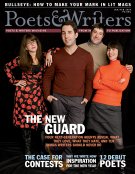Poets have long known that there is as much power in words that are missing as in those that rest on the page. Anne Carson provided a brilliant example of this in If Not, Winter, her 2002 translation of the work of the ancient Greek poet Sappho. Of the nine books of lyric poetry that Sappho wrote—on papyrus rolls—only one poem has survived intact; the rest are fragments. To indicate where words are missing or, in some cases, are illegible, Carson included brackets, so that one of the fragments begins "]heart / ]absolutely / ]I can" while another is a single word trapped in, as John D'Agata put it in an essay in the Boston Review, "a blizzard of brackets." The haunting fragments bring to mind the best erasure poetry, in which the poet alters an existing text by striking or erasing words. Fact-Simile Editions, an independent press in Denver, recently published a unique example of this form of found poetry. While The 9/11 Commission Report is an important and compelling text in its own right (indeed, when it was published in 2004 the report soared to the top of several best-seller lists and was named a finalist for the 2004 National Book Award in nonfiction), its riveting account is nevertheless crowded by the mountain of information that the commission was obligated to document. Travis Macdonald, a graduate of the Jack Kerouac School of Disembodied Poetics at Naropa University and a coeditor, with JenMarie Davis, of Fact-Simile Editions, used the text for an erasure titled The O Mission Repo that is a moving commentary on what Davis calls the "shifting fields of language that have arisen in the post-9/11 world." For instance, the second page of the preface, or "reface," as Macdonald has modified it, reads: "Our aim has been to / redress / Its / lexicon / adjust the / lines within / between and / across / loss / and / balance / event / against / the instruments of / change / over every page" with heavy black lines obliterating every word of text save those that remain. In another section, "The Found Error," taken from the original chapter titled "The Foundation of the New Terrorism," the preserved words seem to float down the pages as if in clouds, the missing words literally erased from the text. Macdonald lived in Brooklyn, New York, at the time of the terrorist attacks, and Davis says he performed the erasure "with the alternating tenderness and rage of one who has experienced the uncertainties of this changed world firsthand." The press also publishes a biannual poetry magazine of the same name that is always open to submissions of "work that pushes the envelope of polite society and has little to no regard for the arbitrary margins of genre." Those interested in more erasure poetry might want to check out the Erasures section of the Wave Books Web site, where users can create their own virtual erasures using texts by Henry James and others. Of course, the great thing about erasures is that a poet can use any source text—even this one. Go ahead: Print this page out and run a pen or marker over any of the words or punctuation to see what kind of poem emerges. Send it to us (90 Broad Street, Suite 2100, New York, NY 10004) and we'll post it online.
Hol Art Books, a fledgling independent in Tucson, Arizona, dedicated to the publication of writing on visual art, is developing a collaborative publishing model worth noting. Anyone can submit a complete manuscript, a rough draft, or a proposal and sample chapter of a book; the press will post it on the Web site. There readers can review it and, if moved to do so, apply to join a "project team." All such teams include a project manager, author, editor, publicist, graphic designer, and bookstore sponsor. Once a team is assembled, the members collaborate online to develop the book. If a given book then passes a review process by other project teams, Hol will print it, market it, and get it on bookstore shelves. Everyone involved receives a percentage of sales. Publisher Greg Albers says several teams have been assembled and the press's first books will be published in the fall. "Though our particular focus is writing about visual art," he adds, "I hope the model we're developing will prove a viable new approach to publishing in all areas."
Kevin Larimer is the deputy editor of Poets & Writers Magazine.








